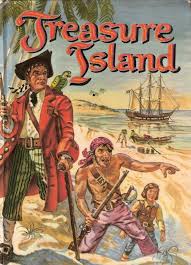Treasure Island Page #10
Treasure Island is an adventure novel by Scottish author Robert Louis Stevenson, narrating a tale of "buccaneers and buried gold".
Over on the back the same hand had written this further information: Tall tree, Spy-glass shoulder, bearing a point to the N. of N.N.E. Skeleton Island E.S.E. and by E. Ten feet. The bar silver is in the north cache; you can find it by the trend of the east hummock, ten fathoms south of the black crag with the face on it. The arms are easy found, in the sand-hill, N. point of north inlet cape, bearing E. and a quarter N. J.F. That was all; but brief as it was, and to me incomprehensible, it filled the squire and Dr. Livesey with delight. “Livesey,” said the squire, “you will give up this wretched practice at once. Tomorrow I start for Bristol. In three weeks' time--three weeks!--two weeks--ten days--we'll have the best ship, sir, and the choicest crew in England. Hawkins shall come as cabin-boy. You'll make a famous cabin-boy, Hawkins. You, Livesey, are ship's doctor; I am admiral. We'll take Redruth, Joyce, and Hunter. We'll have favourable winds, a quick passage, and not the least difficulty in finding the spot, and money to eat, to roll in, to play duck and drake with ever after.” “Trelawney,” said the doctor, “I'll go with you; and I'll go bail for it, so will Jim, and be a credit to the undertaking. There's only one man I'm afraid of.” “And who's that?” cried the squire. “Name the dog, sir!” “You,” replied the doctor; “for you cannot hold your tongue. We are not the only men who know of this paper. These fellows who attacked the inn tonight--bold, desperate blades, for sure--and the rest who stayed aboard that lugger, and more, I dare say, not far off, are, one and all, through thick and thin, bound that they'll get that money. We must none of us go alone till we get to sea. Jim and I shall stick together in the meanwhile; you'll take Joyce and Hunter when you ride to Bristol, and from first to last, not one of us must breathe a word of what we've found.” “Livesey,” returned the squire, “you are always in the right of it. I'll be as silent as the grave.” PART TWO--The Sea-cook 7 I Go to Bristol IT was longer than the squire imagined ere we were ready for the sea, and none of our first plans--not even Dr. Livesey's, of keeping me beside him--could be carried out as we intended. The doctor had to go to London for a physician to take charge of his practice; the squire was hard at work at Bristol; and I lived on at the hall under the charge of old Redruth, the gamekeeper, almost a prisoner, but full of sea-dreams and the most charming anticipations of strange islands and adventures. I brooded by the hour together over the map, all the details of which I well remembered. Sitting by the fire in the housekeeper's room, I approached that island in my fancy from every possible direction; I explored every acre of its surface; I climbed a thousand times to that tall hill they call the Spy-glass, and from the top enjoyed the most wonderful and changing prospects. Sometimes the isle was thick with savages, with whom we fought, sometimes full of dangerous animals that hunted us, but in all my fancies nothing occurred to me so strange and tragic as our actual adventures. So the weeks passed on, till one fine day there came a letter addressed to Dr. Livesey, with this addition, “To be opened, in the case of his absence, by Tom Redruth or young Hawkins.” Obeying this order, we found, or rather I found--for the gamekeeper was a poor hand at reading anything but print--the following important news: Old Anchor Inn, Bristol, March 1, 17-- Dear Livesey--As I do not know whether you are at the hall or still in London, I send this in double to both places. The ship is bought and fitted. She lies at anchor, ready for sea. You never imagined a sweeter schooner--a child might sail her--two hundred tons; name, HISPANIOLA. I got her through my old friend, Blandly, who has proved himself throughout the most surprising trump. The admirable fellow literally slaved in my interest, and so, I may say, did everyone in Bristol, as soon as they got wind of the port we sailed for--treasure, I mean. “Redruth,” said I, interrupting the letter, “Dr. Livesey will not like that. The squire has been talking, after all.” “Well, who's a better right?” growled the gamekeeper. “A pretty rum go if squire ain't to talk for Dr. Livesey, I should think.” At that I gave up all attempts at commentary and read straight on: Blandly himself found the HISPANIOLA, and by the most admirable management got her for the merest trifle. There is a class of men in Bristol monstrously prejudiced against Blandly. They go the length of declaring that this honest creature would do anything for money, that the HISPANIOLA belonged to him, and that he sold it me absurdly high--the most transparent calumnies. None of them dare, however, to deny the merits of the ship. So far there was not a hitch. The workpeople, to be sure--riggers and what not--were most annoyingly slow; but time cured that. It was the crew that troubled me. I wished a round score of men--in case of natives, buccaneers, or the odious French--and I had the worry of the deuce itself to find so much as half a dozen, till the most remarkable stroke of fortune brought me the very man that I required. I was standing on the dock, when, by the merest accident, I fell in talk with him. I found he was an old sailor, kept a public-house, knew all the seafaring men in Bristol, had lost his health ashore, and wanted a good berth as cook to get to sea again. He had hobbled down there that morning, he said, to get a smell of the salt. I was monstrously touched--so would you have been--and, out of pure pity, I engaged him on the spot to be ship's cook. Long John Silver, he is called, and has lost a leg; but that I regarded as a recommendation, since he lost it in his country's service, under the immortal Hawke. He has no pension, Livesey. Imagine the abominable
Translation
Translate and read this book in other languages:
Select another language:
- - Select -
- 简体中文 (Chinese - Simplified)
- 繁體中文 (Chinese - Traditional)
- Español (Spanish)
- Esperanto (Esperanto)
- 日本語 (Japanese)
- Português (Portuguese)
- Deutsch (German)
- العربية (Arabic)
- Français (French)
- Русский (Russian)
- ಕನ್ನಡ (Kannada)
- 한국어 (Korean)
- עברית (Hebrew)
- Gaeilge (Irish)
- Українська (Ukrainian)
- اردو (Urdu)
- Magyar (Hungarian)
- मानक हिन्दी (Hindi)
- Indonesia (Indonesian)
- Italiano (Italian)
- தமிழ் (Tamil)
- Türkçe (Turkish)
- తెలుగు (Telugu)
- ภาษาไทย (Thai)
- Tiếng Việt (Vietnamese)
- Čeština (Czech)
- Polski (Polish)
- Bahasa Indonesia (Indonesian)
- Românește (Romanian)
- Nederlands (Dutch)
- Ελληνικά (Greek)
- Latinum (Latin)
- Svenska (Swedish)
- Dansk (Danish)
- Suomi (Finnish)
- فارسی (Persian)
- ייִדיש (Yiddish)
- հայերեն (Armenian)
- Norsk (Norwegian)
- English (English)
Citation
Use the citation below to add this book to your bibliography:
Style:MLAChicagoAPA
"Treasure Island Books." Literature.com. STANDS4 LLC, 2024. Web. 23 Dec. 2024. <https://www.literature.com/book/treasure_island_32>.




Discuss this Treasure Island book with the community:
Report Comment
We're doing our best to make sure our content is useful, accurate and safe.
If by any chance you spot an inappropriate comment while navigating through our website please use this form to let us know, and we'll take care of it shortly.
Attachment
You need to be logged in to favorite.
Log In